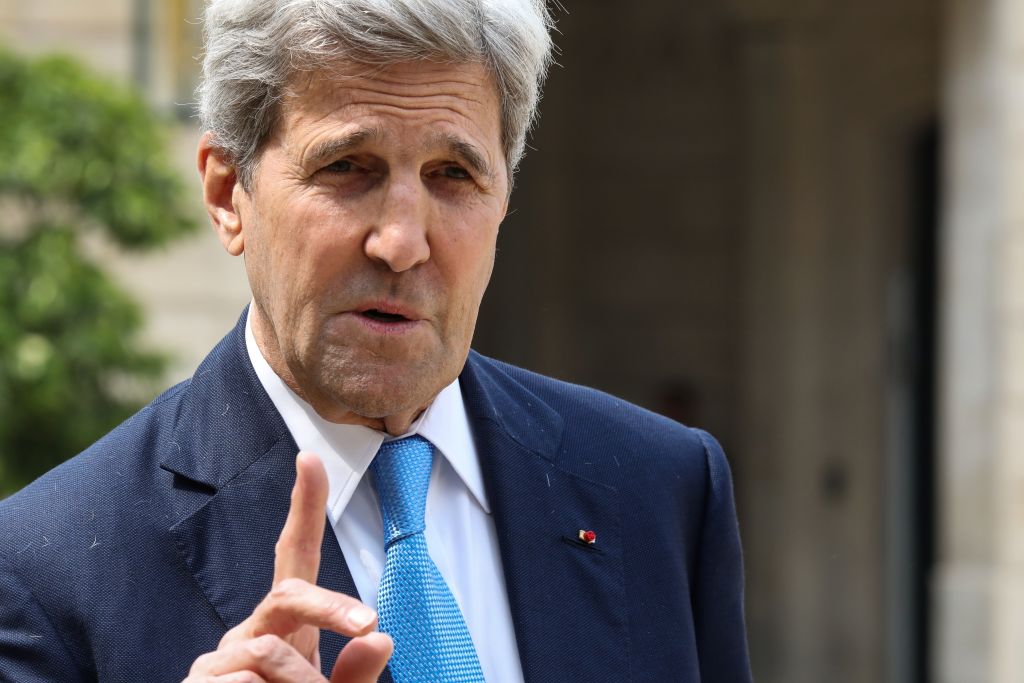‘Boys come up, I’m going to be president.’
That’s what John Kerry, Massachusetts senator and the Democratic nominee, told a close group of sometime-advisers at 8 p.m. on election night in 2004, or so a source familiar recounts.
That year, and his near unseating of George W. Bush, still shape most Americans’ public perception of the 74-year-old: regal but aloof. That campaign seems prehistoric now: pre-Twitter, and preceding the candidate himself using Twitter for the day’s cavil.
But that would be giving 2004 short shrift: the contest was as acrimonious as any prior. The characters central to the story — Bush, Kerry, Joe Biden, Barack Obama, John McCain — are still at the fore of American politics, as shown by the Resistance meeting held at Washington’s National Cathedral this weekend in memory of Mr. McCain’s life.
In 2004, Kerry looked at McCain, a Republican and Bush’s old primary foe, as his running mate. Biden told Chris Matthews of MSNBC he would support such an idea. And the justification for such a manoeuvre would set the stage for the style in which the Democrats would finally prevail four years later: with a call to unity.
‘We need some unity here, man. The red states and the blue states – we got to have something to coalesce around here,’ Biden told Matthews. Less than a half-decade later, Biden would serve as running mate for 2004’s breakout star: Barack Obama. The then-Illinois state senator would famously tell the DNC Convention hall in Boston: ‘We worship an awesome God in the blue states, and we don’t like federal agents poking around our libraries in the red states. We coach little league in the blue states and, yes, we’ve got some gay friends in the red states.’ It killed.
Obama would later mourn that he failed in this core mandate of his tenure. And Americans at the close of his time in office would agree that he left a country more divided than united. But the McCain funeral was instructive: elite desire for unity, for consensus is authentic. Among the establishment, there is a view that the United States is failing, and perhaps as evidenced by Donald Trump’s rise, has been for some time. Obama’s calls for unity were sometimes mocked by leftist critics. ‘Obama… he doesn’t come out swinging,’ lamented liberal historian Thomas Frank early in his presidency. ‘And at the end of the day, he really believes the stuff about bipartisanship. It’s not just an act for him. I think he honestly, really believes it.’
And this desire hasn’t died with Obama’s tenure. If anything, it’s been revitalised and consolidated — George W. Bush is an odd darling of the centre-left now. And this call to unity in a moment of national crisis is the central template for the ‘Resistance’ to Trump. Come 2020, if Trump is again the nominee, the central question will be who will serve as the vessel for this contingent. ‘Re-election campaigns aren’t for artists,’ a veteran political observer told me on Tuesday.
Another opines: ‘The USA’s best path forward is a full term for Donald, followed his emphatic failure to win a second term, so emphatic that only the most bonzo of his base can blame it simply on a Deep State conspiracy.’
Enter Kerry. It may seem pathetic and hilarious to his detractors. But evidence is emerging that he could get the last laugh: that he, oddly enough, fits this bill. In a field that will likely exceed forty major candidates — past or current national or statewide office holders, past or former Cabinet officials, prominent mayors, or major celebrities or businessmen — Kerry would start near the top by pure name recognition. If Joe Biden, older than Kerry and afraid of being crushed for a third time, passes, Kerry could theoretically start the race as the best-known, establishment favourite. The strategy would be to be as deferential to the party’s rising stars as possible, while highlighting his wealth of personal experience. His message would be similar to that of another former Massachusetts politician — Mitt Romney — who in 2012, after insurgent midterm victories in 2010, candidly ran on a platform of ‘let’s not mess this up.’ Kerry is even more tested.
And he is already laying the groundwork to unite those calling for centrist action with an ascendant, left-wing youth movement in his own party. ‘I think each Democratic candidate is going to define it as they go out and speak to people in their districts, and out of that I believe will come the future consensus that’s necessary to take a party as a whole to a better place,’ he told Margaret Brennan of ‘Face The Nation’ in an extraordinary one-hour interview that aired this weekend. ‘Congratulations @AyannaPressley,’ Kerry tweeted at the triumphant insurgent Massachusetts primary challenger Tuesday night. ‘Couldn’t be more proud of you and can’t help but imagine the smile on Mama Pressley’s face watching you from heaven. She’s beaming.’ He also thanked the vanquished: ‘And thank you @mikecapuano for your decades of service to our nation and to Massachusetts: a liberal force and I’m grateful for your friendship. A campaign between two great people.’
The Washington fixture said to Brennan: ‘I’ll probably get smacked for this but, you know, what I learned running for president is that you don’t have a party per se where you have adherence to a strict platform et cetera. You have an amalgamation. You have a group of people who call themselves Democrats, but they speak with different nuances and different approaches to various aspects of political life.’
For Kerry, ‘every day is extra,’ the title of his new memoir. In the book, he strives to strikes a magnanimous chord. Unlike other failed Democratic nominees for president, he looks ahead. Of questions on the vote in Ohio in 2004, Kerry implicitly contrasts himself with Hillary Clinton and the vote in 2016: ‘I thought the better thing to do was to move on, to concede, to- to keep America from having to go through a lawsuit over its election at a time that we were at war…I didn’t want to waste the country’s time or my time in what I think would have been completely taken as a personal and venal effort by me to, you know, take care of myself not take care of the country.’
Still, Kerry’s ambition for an encore is apparent. ‘There are two good reasons for an American politician to write his memoirs,’ writes conservative reviewer Barton Swaim in the Wall Street Journal. ‘The first is that he was the President of the United States. In that case, it doesn’t much matter what he writes — readers will want to read it simply because he was president. The second reason is that the politician has something to say, some notable experience or insight that he can relay from his time in office. John Kerry fits snugly into the second category — he was a US senator from Massachusetts, a secretary of state and in 2004 the Democratic presidential nominee — but he seems to think that he belongs in the first.’
A critique of Kerry — and his leftist and rightist critics will both pounce on this — is his conventionality. In his desire to lead a big tent revival of the Democratic party, he could resuscitate political elements that many were happy to see held at bay in the Obama years. Kerry is more interventionist than the 44th President. It was not much of a secret during his years at Foggy Bottom that Kerry disagreed with the president over Assad and Syria, even quietly approving of State Department dissent cables. He confirmed as much to Brennan: ‘We paid a price for the way it played out without the red line being enforced.’ Here another parallel to Romney emerges. If 2012 was about Obamacare, 2004 was about Iraq. Romney was charged with prosecuting the case against national legislation he essentially shepherded at the state level; Kerry was tasked with prosecuting the case against the management of the war he voted for. I asked that source close to Kerry’s campaign how history might have been different if the future secretary of State had won in 2004. No surge or continuation in Iraq? His response is consonant with those troubled by the enduring prominence of those like Kerry: ‘Nothing would have changed.’

























